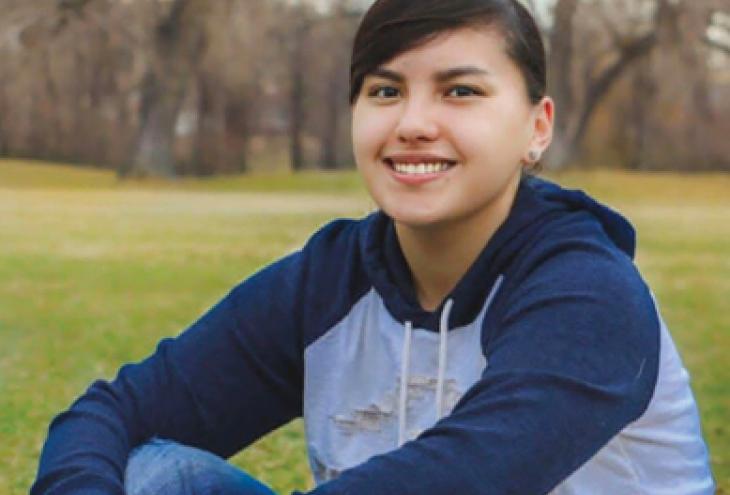I grew up in Eagle Butte, a small town on the Cheyenne River Indian Reservation in South Dakota. I’m Lakota from the Cheyenne River Sioux Tribe. My home consisted of my parents, four siblings, many cousins, and friends. My parents have huge hearts and always welcomed children into our home.
My immediate family has always encouraged me to be the best that I could be and has had a strong influence on my long-term goals. My parents have told me to consider doing what will make me happy in the end.
When I chose to study pre-dental hygiene at Black Hills State University (BHSU), I felt good about the decision. I became interested after seeing how hard it was for people on the reservation to get an appointment for regular checkups and cleanings with the Indian Health Service (IHS). At the time, IHS had only one dental hygienist. Now they have two, but it still takes a few weeks to schedule an appointment, which leads some people to neglect their teeth.
Another contributing factor in my decision to pursue dental hygiene is the diabetes epidemic in Indian Country. I strongly feel that if I reach out to the youth in the communities within my reservation and educate them about healthy eating habits, as well as how different types of foods and candy can affect their bodies and the life span of their teeth, then I’m making a difference. This will help them better understand how important oral hygiene is, which in turn could potentially lead to a healthier lifestyle. Dental hygiene affects more than just your smile — it also contributes to your self-esteem, social life, education, and job opportunities. There’s so much more that comes with having good teeth than people realize because once you lose your teeth, they’re gone forever.
I attended Cheyenne–Eagle Butte High School. Looking back, I’d say my schooling helped me realize the importance of attending college so I could get a good job and make a difference in this world, especially with tribal communities. At first, I was worried about how I was going to pay for college, as that was the biggest obstacle for me. But I applied for many different scholarships — more than I can count — and so far, my efforts have paid off and covered many of my expenses. Based on my experience, I strongly encourage others to apply for as many scholarships as possible.
My advice to other students who hope to attend college is that academics have to come first, so don’t let anyone or anything come between you and your education.
Now that I’m in my second year at BHSU, I’ve overcome much of the shyness and nervousness I experienced the first year here. I realized that being afraid to ask questions was a real hindrance. Asking the professor to explain something again so that I could better grasp the concepts only helps me do better academically.
Homesickness was another obstacle I had to overcome. Once I got out of my comfort zone and became involved with campus activities and made some friends who share many of my same interests, it became much easier to be away from home.
As a sophomore, my campus activities include intramural sports such as basketball, volleyball, and football. I’m also co-president of the Lakota Omniciye, which means “a gathering assembly” in Lakota. It’s one of the largest student organizations on campus in terms of participation and budget. This organization promotes fellowship among Indian and non-Indian students, and organizes an annual cultural awareness week and wacipi (powwow) in early April that’s now in its 35th year. In past years, the wacipi has attracted as many as 3,500 people, making it one of the larger powwows in South Dakota.
I’m also a member of AISES, which I joined before I entered college. AISES has helped me by recommending scholarships to apply for and upcoming conferences I could attend, in addition to giving me leads on internships. AISES has also helped me connect with other Native members on campus.
BHSU is very supportive of Native American students on campus. I haven’t seen any of the Native students struggle here because people at the Center for American Indian Studies are always willing to lend a helping hand. I recommend Black Hills State to all future freshmen or transferring students, and especially Native students.
My advice to other students who hope to attend college is that academics have to come first, so don’t let anyone or anything come between you and your education. The easiest way to ensure your success in college is to attend classes every day because if you skip, professors notice your lack of commitment, which only hurts your credibility as a student and, ultimately, your GPA.
I’m pretty self-motivated about my schoolwork, which shows in my effort to get good grades. From the courses I’ve taken so far, I’d say my psychology class has had one of the biggest influences on me. It opened up a new perspective on the psychological aspects of people. Another class that helped me a lot was English composition. Writing skills are especially important because they are used in almost all jobs — not to mention scholarship applications.
My ultimate career goal is to make an impact on Native communities through hands-on dental work and education about the importance of dental hygiene, and research to help find better solutions. I had my first experience doing research as an intern this past summer with Sanford Health’s Summer Undergraduate Research Experience. The internship focused on social and behavioral research with American Indian community–based projects. I learned the importance of patience in collecting data to eventually obtain answers, and I’m now considering this field as a career. It was a valuable experience that helped me focus even more on future possibilities.













